John Edward Simkin
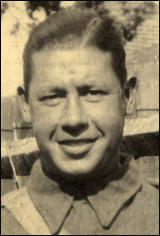
John Edward Simkin was born in Finsbury, London, on 17th January, 1914. His father, John Edward Simkin, was killed during the First World War. His mother Jane Simkin, remarried Harry White.
In 1935, Jane and Harry, John, his brother William, and their half-sister, Lily White, moved to a flat in Garnham Street, Stoke Newington. Muriel Hughes, was asked by her uncle to help the family with their radio aerial.
Both of Mrs White's sons showed an interest in twenty-year-old Muriel. Bill wanted to ask her out, but John (known to all of his friends as Ted) told his mother, that he had just met "the girl he was going to marry". Bill was the first one to make a move, but it was Ted who successfully invited her to go out with him to see the film Mutiny on the Bounty, starring Charles Laughton and Clark Gable.
Muriel's sister, Stella Hughes, was only nine-years-old when Ted took Muriel on their first date. Stella was anxious to see the new boyfriend and when he brought her back home she leant over the upstairs bannister rails. However, she could not see him as he was standing outside, but she could hear him singing a song to Muriel, Without a Word of Warning, a hit for Bing Crosby that first appeared in the film, Two for Tonight (1935).
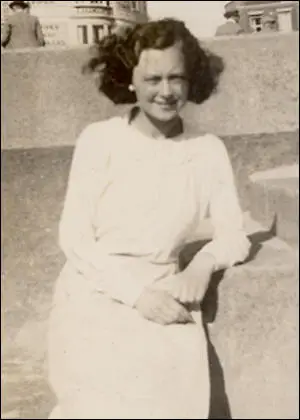
Ted Simkin worked at the large Mac Fisheries depot at Finsbury Park in North London and spent time as a porter at the famous Billingsgate Fish Market before becoming a "fish salesman". Muriel talked fondly about the high-quality fish he was able to supply free of charge to the Hughes family. According to Muriel, during this period, Ted had a very outgoing personality, and with his accordion playing, he was a popular guest at parties.
Stella says that Ted was always telling jokes and was a very funny man. He was also a fanatical Spurs supporter and he often took her to White Hart Lane to see games. Muriel was not interested in football and did not go to games. Stella admitted she was not interested either but she took the opportunity to go out with Ted. However, she soon learnt to love the game and has been a life-long supporter of Spurs.
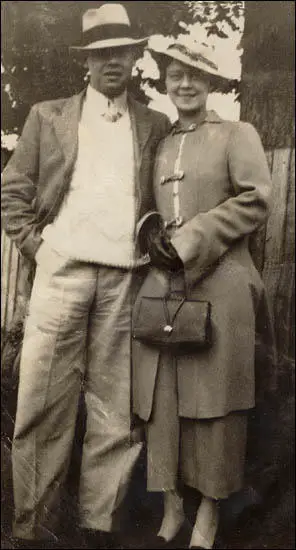
Ted had not known his father, John Edward Simkin, who had been killed on the Western Front in 1915 when he was only one year-old. He did not see much of his stepfather, Harry White, who left the family home when he was very young, According to Muriel it seems that an older colleague at work, Izzie Wright, became a father figure. In the early days of their relationship they went on outings to the countryside or the seaside with other couples, including Izzie and his wife Lilly, and Muriel's cousin Winnie Treweek and her new husband George Logsdon.
John Simkin married Muriel Hughes at West Hackney Church, Stoke Newington on 26th August 1939. They went away for two weeks at Weymouth. While on their honeymoon Neville Chamberlain announced that Britain was at war with Germany. She recalled: "We were on our honeymoon when war was declared. We had planned to have a fortnight's holiday, but we had to come home after a week. It was not a very good start to our married life."
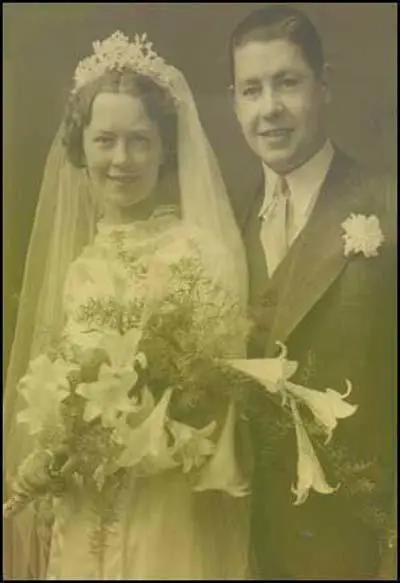
John Simkin, was photographed Louis Edward Muller, a German immigrant.
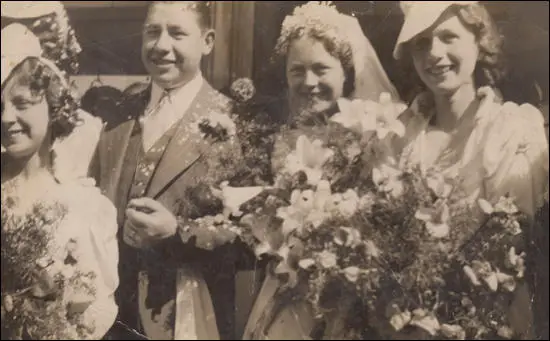
Stella, her sister and Winnie, her future sister-in-law.
On their return they moved into their new council house in 98 Rogers Road, Dagenham, Essex. At the time of her marriage, Muriel was employed as an "Examiner and Finisher" at the London tailoring firm of Horne Brothers, earning 8s 6d a week. On the first day of the Second World War, Parliament passed the National Service (Armed Forces) Act, under which all men between 18 and 41 were made liable for conscription. The registration of all men in each age group in turn began on 21st October for those aged 20 to 23. Ted continued his work as a salesman at the fish market until he was conscripted into the Royal Artillery on 15th July 1940.
"I went with my parents to London to see off my husband and brother. They had both been called up by the army. After we left them at the railway station we got caught in an air-raid. We had to get off the bus after it caught fire. We ran for shelter. While we were running, I looked at my dad and he appeared to be on fire. I said: "Dad, you're alight." He nearly had a heart attack and I was not very popular when he discovered that I was mistaken and that it was only the torch in his pocket that had been accidentally turned on while he was running."
Young women without children were encouraged to do war work. Muriel joined the Briggs munitions factory in Dagenham. During the Blitz, these factories were a major target for the Luftwaffe. Mum's work was highly dangerous: "It was a terrible job, but we had no option. We all had to do war work... We had to wait until the second alarm before we were allowed to go to the shelter. The first bell was a warning they were coming. The second was when they were overhead. They did not want any time wasted. The planes might have gone straight past and the factory would have stopped for nothing."
These regulations made the work especially precarious. "Sometimes the Germans would drop their bombs before the second bell went. On one occasion a bomb hit the factory before we were given permission to go to the shelter. The paint department went up. I saw several people flying through the air and I just ran home. I was suffering from shock. I was suspended for six weeks without pay. They would have been saved if they had been allowed to go after the first alarm... We were risking our lives in the same way as the soldiers were."
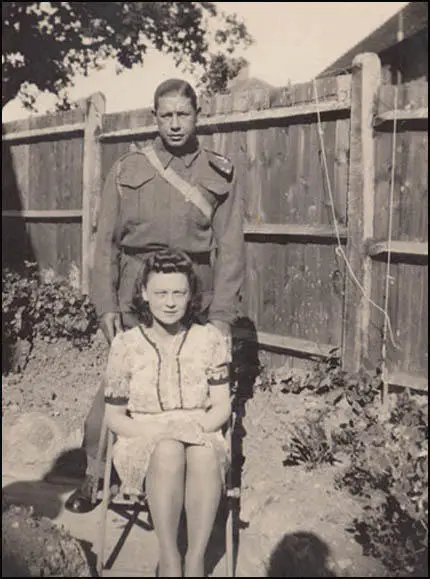
On the outbreak of the war, Sir John Anderson, the Home Secretary and the Minister of Home Security, commissioned the engineer, William Patterson, to design a small and cheap shelter that could be erected in people's gardens. Within a few months nearly one and a half million of these Anderson Shelters were distributed to people living in areas expected to be bombed by the Luftwaffe. Anderson shelters were given free to poor people. Men who earned more than £5 a week could buy one for £7. The main problem was that under a quarter of the public had no gardens. Made from six curved sheets bolted together at the top, with steel plates at either end, and measuring 6ft 6in by 4ft 6in (1.95m by 1.35m) the shelter could accommodate six people. These shelters were half buried in the ground with earth heaped on top. The entrance was protected by a steel shield and an earthen blast wall.
Muriel had one of these shelters in her garden. "We had an Anderson shelter in the garden. You were supposed to go into the shelter every night. I used to take my knitting. I used to knit all night. I was too frightened to go to sleep. You got into the habit of not sleeping. I've never slept properly since. It was just a bunk bed. I did not bother to get undressed. It was cold and damp in the shelter. I was all on my own because my husband was in the army."
In 1940 Muriel and Ted had a lucky escape: "You would go nights and nights, and nothing happened. On one occasion when my husband was on leave, I think it was a weekend, we decided we would spend the night in bed instead of in the shelter. I heard the noise and woke up and I would see the sky. They had dropped a basket of incendiary bombs and we had got the lot. Luckily not one went off. Next morning the bombs were standing up in the garden as if they had grown in the night."
Muriel claimed that certain things improved during the war: "People on the whole were more friendly during the war than they are today - happier even. People helped you out. You had to have a sense of humour. You couldn't get through it without that. The worst part was having you husband and brothers away from you. We never heard from Jack, my brother, for five months. He couldn't communicate at all because he was involved in important battles in North Africa. It was very worrying. We knew a lot of his regiment had been killed. Then we saw his picture in the Daily Express newspaper. He was being inspected by General Montgomery. It was not until then that we knew he was alive."
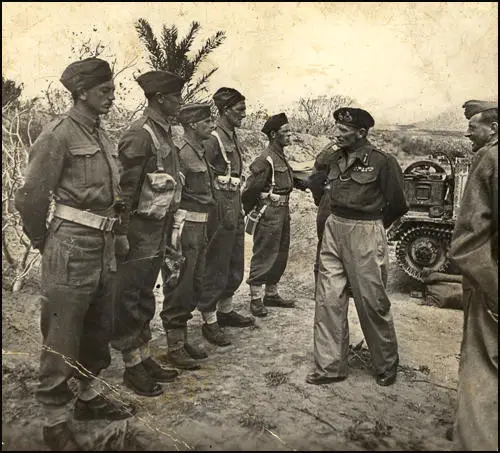
in North Africa in 1942. Corporal Jack Hughes, Muriel Simkin's younger brother
stands on the far left of the row of soldiers.
Muriel Simkin managed to survive the bombing raids, but the extended family did suffer one major tragedy. "Rosie, my mum's sister, had to go to hospital to have a baby. Her mother-in-law looked after her three-year-old son. There was a bombing raid and Rosie's son and mother-in-law rushed to Bethnal Green underground station. Going down the stairs somebody fell. People panicked and Rosie's son was trampled to death."
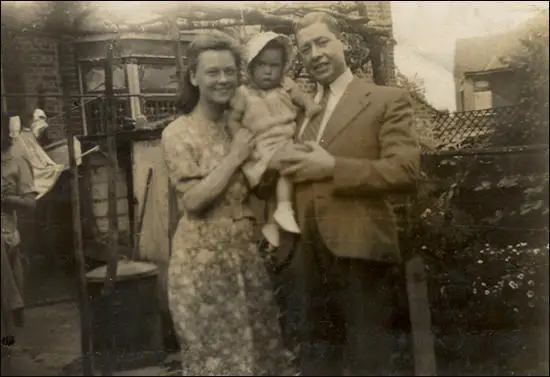
Simkin was called up for military service on 15 July 1940 and joined the Royal Artillery. He was a member of a team operating an anti-aircraft battery during the Battle of Britain. Later he served at Biggin Hill, Rochford and Dover. He was wounded in 1944 and as a result missed taking part in the D-Day landings.
After the Second World War he worked at the Every-Ready factory in Edmonton. John Simkin died in road accident on 16th October, 1956.
